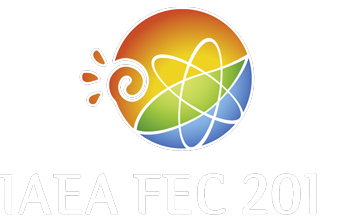Speaker
Mr
Jeongwon Lee
(Seoul National University)
Description
ECH-assisted plasma start-up using trapped particle configuration (TPC) is performed in KSTAR 2015 experiment campaign for feasibility study of TPC in superconducting, conventional tokamaks. It is widely known that ECH can significantly assist the start-up of tokamak plasmas with pre-ionization. The dependency of the quality of the ECH pre-ionization plasma on the magnetic configuration has been addressed in VEST systematically where it was found that TPC can achieve better confinement of the pre-ionized plasma compared with the conventional field null configuration (FNC). In KSTAR, a plasma start-up scenario is developed for TPC based on the FNC scenario, by superimposing the TPC structure made by PF#5 onto FNC. As for pre-ionization, 170 GHz, 2nd harmonic X-mode ECH/ECCD is applied. The injection power is up to 600 kW. Toroidal magnetic field is set to be 2.7 T at the major radius to match the resonance layer with the TPC region. Although no enhancement of the plasma start-up is observed under FNC, clear enhancement is shown under TPC. By adding the poloidal field strength of 36 gauss, a significant enhancement is achieved under TPC with the pre-ionization plasma density of 4×10^18 m^(-3). The D_α signal indicates that a highly ionized plasma is formed under the TPC case. Based on these pre-ionization plasmas, much earlier and faster plasma current formation is achieved. The loop voltage signal shows the highly improved plasma current initiation with the lower loop voltage and the higher plasma current ramp-up rate than the FNC case. The start-up experiment under the various poloidal field strength of TPC is performed which shows that the plasma start-up performance with TPC strongly depends on the vertical field strength so that the quality of the pre-ionization is more important factor than the Lloyd condition for start-up of tokamak plasmas with pre-ionization. Finally, the robust plasma start-up is achieved in 2015 KSTAR campaign, with contaminated wall condition after disruption experiments while continuous failure is observed with FNC. The results show that TPC can be applied to conventional tokamaks for enhanced plasma start-up performance. It is envisaged that TPC can improve the start-up of ITER where a low loop voltage start-up is inevitable due to the limitation of superconducting solenoid coils.
| Country or International Organization | Republic of Korea |
|---|---|
| Paper Number | EX/P4-14 |
Author
Mr
Jeongwon Lee
(Seoul National University)
Co-authors
Dr
Jayhyun Kim
(National Fusion Research Institute)
Mr
Min-Gu Yoo
(Seoul National University)
Prof.
Y.S. Hwang
(Seoul National University)
Prof.
Yong-Su Na
(Seoul National University)
Dr
YoungHwa An
(National Fusion Research Institute)

